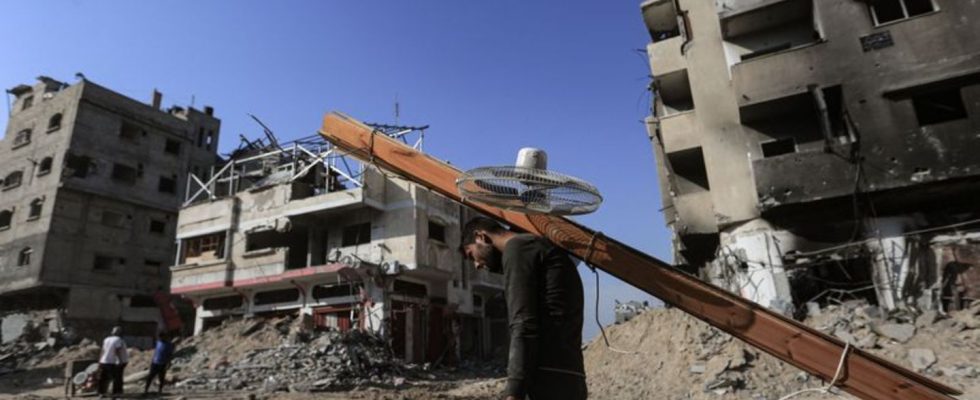Middle East
Muted hopes for a ceasefire in the Gaza war
A Palestinian with his belongings returning to Khan Yunis. photo
© Mohammed Talatene/dpa
After months of back and forth, there is hope for an agreement on a ceasefire in the Gaza war. But a breakthrough is still a long way off. The news at a glance.
Shortly before, Egyptian security circles had said that “slight progress” had been made in the negotiations that began on Sunday. It is unclear whether an agreement will be reached by the end of Ramadan. The fasting month is expected to end on Wednesday. There is currently no official information on the status of negotiations.
Meanwhile, according to Israeli Prime Minister Benjamin Netanyahu, the date for the offensive in Rafah in the Gaza Strip has been set.
Conflicting reports about negotiations
Israeli opposition leader Jair Lapid told Israeli radio that a deal was on the table and needed to be agreed. “We have to put pressure on this (Israeli) government to close the deal,” said Lapid. It will be a deal that we don’t like, but we have to do it because we have to bring them home,” he said, referring to the hostages remaining in Hamas’s control. Lapid is currently in the United States for talks .
The state-affiliated Egyptian television channel Al-Kahira News had previously reported, citing a senior Egyptian source, that there was an agreement on the fundamental points between all parties involved. A further round of negotiations will therefore take place after the individual parties have discussed the results so far with their leaders. Since Israel and Hamas do not speak to each other directly, the USA, Qatar and Egypt act as mediators.
According to information from the USA, the deal now depends on Hamas. At the end of the weekend, a proposal was made to Hamas and it is now up to Hamas to accept it, said John Kirby, communications director for the US government’s National Security Council.
Right-wing extremist partners are increasing pressure on Netanyahu
Meanwhile, pressure on Israeli Prime Minister Benjamin Netanyahu continues to grow in his own country. After the withdrawal of Israeli troops from the south of the Gaza Strip, Netanyahu’s far-right coalition partner Itamar Ben-Gvir wrote on Platform X: “If the prime minister decides to end the war without a broad attack on Rafah to decisively defeat Hamas “He has no mandate to continue to serve as head of government.”
On Sunday, the army unexpectedly withdrew from the embattled town of Khan Yunis in the south of the coastal region. However, it is unclear whether the withdrawal could be related to the ceasefire negotiations in Cairo or to a possible military offensive in Rafah in the southern Gaza Strip. According to Netanyahu, there should already be a date for the start of an offensive in Rafah. “This will happen, there is a date,” he said on Monday evening.
The US and Germany have repeatedly warned Israel against a large-scale ground offensive in Rafah. US President Joe Biden had made it clear to Netanyahu that an invasion there without first evacuating civilians would be a “red line” for him. According to Kirby, representatives from both countries are expected to discuss the planned ground offensive at a personal meeting next week.
World Food Program urges further opening of borders
The World Food Program (WFP) called on Israel to quickly process aid supplies at the border crossings from Israel to the Gaza Strip. According to WFP, the aid waiting there includes supplies that will last for more than a million people for three months. The aid just needs to be brought to the Gaza Strip in order to alleviate hunger, especially among younger children, with suitable food, said Cindy McCain, director of the WFP, to the US broadcaster CNN.
On Friday, Israel announced that, in addition to Erez, it would also open the port of Ashdod for aid transport in order to improve the supply situation in the north of the Gaza Strip. The announcement has not yet been implemented. A spokeswoman for Israel’s Cogat authority said: “As for the Erez crossing, the details will be communicated in the future.” The crossing, which was used for passenger traffic until the Gaza war, was badly damaged in the Hamas terrorist attack and has been closed since then.
On Sunday, Cogat announced that the highest number of trucks had been dispatched since the start of the war. Accordingly, 322 trucks carrying relief supplies are said to have been brought to the coastal area. In New York, however, UN spokesman Stéphane Dujarric, citing the Palestinian relief organization UNRWA, said that only 103 trucks carrying relief supplies entered the Gaza Strip on Sunday. That’s roughly the same number as last time, so there has been “no increase yet” since Israel’s announcement on Friday. The information cannot yet be independently verified.
Since Hamas’ attack on Israel’s border areas on October 7th, which left more than 1,200 dead, the Israeli military says it has been taking action against Hamas military targets. Israel has come under strong international criticism because of the high number of casualties among the Palestinian civilian population and the insufficient supply of food.

